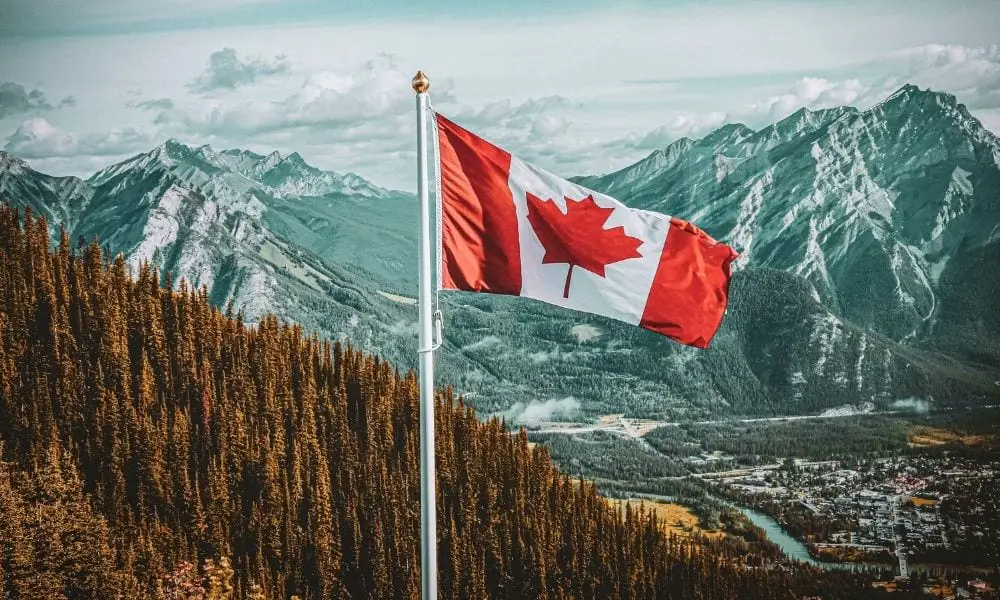

The American flag is, of course, one of the most iconic flags in the world. But almost as recognizable is the flag of Canada, our friendly neighbors to the north: the simple red and white of the Maple Leaf. The Canadian flag is a symbol of tolerance, multiculturalism, compassion, and innovation. But for such a familiar symbol, the Maple Leaf flag is relatively new to the vexillological scene. Here’s a look at the history of the Canadian flag and how we arrived at the effective and memorable design we recognize today.
While the United States swiftly gained their independence from the British Empire, Canada remained loyal to the British crown for many years after. Even to this day, Canada ceremonially recognizes Queen Elizabeth II as its head of state. As such, the Union Jack, the familiar flag of the United Kingdom, flew over Canada for many years as its official flag. However, Canadians, even those loyal to Britain, hoped to assert their Canadian identity with a flag of their own.
In 1868, Canadians informally adopted Britain’s Red Ensign, or naval flag, as a national symbol, with one important change. The Red Ensign featured a red field with the Union Jack in the upper-left corner—recognizable as a precursor to the American flag we know today. On the field lay Canada’s coat of arms—a shield featuring English lions, the Irish harp, the French fleur-de-lis, and three Canadian maple leaves. These national symbols synthesized Canada’s British and French heritage with its own native iconography. Meanwhile, the dominion of Newfoundland, which was not a province of Canada until 1949, flew the Union Jack alongside an unofficial tricolor of green, white, and rose. This Canadian Red Ensign would unofficially represent Canada well into the middle of the 20th century.
By 1964, while the United States approached its bicentennial, Canada was in many ways still tied to the United Kingdom, and many Canadians wanted a flag of their own to represent their growing autonomy. The first proposal for a Canadian flag featured three maple leaves on white between two blue stripes, but the flag met objections from those who wanted to include the Union Jack or the fleur-de-lis as nods to their English and French heritage. The debate raged on with thousands of attempts until historian George Stanley submitted the familiar Maple Leaf flag we know today. After further spirited debate, Parliament approved the flag on—in Canadian dating convention—17 December 1964.
The history of the Canadian flag is one of debate and begrudging compromise, even as it has become one of the world’s most recognizable flags. Even within Canada’s borders, the Maple Leaf has not been universally embraced. In French-speaking Québec, whose residents have unsuccessfully attempted to gain independence from the anglophone majority, you’re more likely to see the blue and white provincial flag, the Fleurdelisé, flying from businesses and homes than the red and white Maple Leaf. Maybe Canadians aren’t so agreeable after all.
FAQ
By 1964, while the United States approached its bicentennial, Canada was in many ways still tied to the United Kingdom, and many Canadians wanted a flag of their own to represent their growing autonomy. The first proposal for a Canadian flag featured three maple leaves on white between two blue stripes, but the flag met objections from those who wanted to include the Union Jack or the fleur-de-lis as nods to their English and French heritage. The debate raged on with thousands of attempts until historian George Stanley submitted the familiar Maple Leaf flag we know today. After further spirited debate, Parliament approved the flag on—in Canadian dating convention—17 December 1964.
Additional Resources:
Mexico
Russia
Australia
Peru
Thailand
Japan
South Korea
China
Find out when to upgrade your industrial storage solutions to improve efficiency, boost safety, cut…
Disposable e-cigarettes are redefining how nicotine is consumed—and they're doing so with growing support from…
For smokers seeking a healthier way to enjoy nicotine, innovation has brought forward one of…
Discover the incredible teamwork of bees and how their collaboration sustains ecosystems. Learn how we…
A night out at a top-notch bar with an incredible view can be an unforgettable…
Learn the critical safety features every go-kart track needs. From barriers to emergency solutions, these…